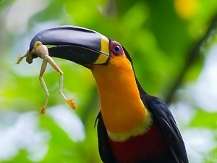Diet affects the evolution of birds

How diet has affected the evolution of the 10,000 bird species in the world is still a mystery to evolutionary biology. A study by Daniel Kissling of the Institute for Biodiversity and Ecosystem Dynamics (UvA) and colleagues from the University of São Paulo and the University of Utah shows how diet preferences have influenced bird diversification over millions of years. The findings were published in Nature Communications.
Since the seminal work by Charles Darwin, it is know that dietary habits of birds can affect the evolution of species, such as the beak sizes of Galapagos finches. However, birds show an astonishing diversity of species and dietary adaptations, ranging from very small nectar-feeding hummingbirds to large carnivorous eagles. How such diverse dietary preferences ultimately lead to differences in diversification dynamics (i.e. the balance between speciation and extinction) of different birds has not yet been examined.
Diet dataset
The researchers compiled an impressive diet dataset of almost all bird species in the world together with a large phylogenetic tree that represent the relatedness of all bird species. Using models of trait-dependent diversification, they then showed that omnivorous bird lineages (with species that feed on many different food items) have lower rates of speciation (i.e. generating less new species) and higher rates of extinction (i.e. losing more existing species) than species which prefer specific food items such as fruits, nectar, or insects. Furthermore, the researchers also found that over deep evolutionary time birds which are specialized on a particular food item often add other food items to their diets, resulting in evolving transitions into omnivory.
Surprised
'I was really surprised to find that omnivores preferentially originate via transitions, and not through speciation', says lead author and PhD student Gustavo Burin from the University of São Paulo. Together with the low speciation rates and high extinction rates, these high transition rates indicate that omnivores originate from more specialized birds that expand their diets, rather than directly through speciation of omnivorous bird clades. 'We suggest that this is caused by resource competition, climate instability, and deep-time availability of food resources', says Burin. High transition rates towards omnivory may arise in times when food is harder to find or when it is temporally unavailable.
Human activities
Expanding these findings to the current human-driven changes on our planet the researchers expect that shifts in competitive dynamics between generalists and specialists will occur. 'Human activities such as habitat destruction and other global change drivers eliminate the resources of many specialist species', says Daniel Kissling from University of Amsterdam. This means that specialists are currently at higher risk of extinction than generalists. 'This will dramatically change the ecology and evolution of life on Earth because generalists are now favoured at the expense of specialists', explains Kissling. Ultimately, this will affect the functioning of ecosystems and the services that nature provides to humanity.
More information: Gustavo Burin et al. Omnivory in birds is a macroevolutionary sink, Nature Communications (2016). DOI: 10.1038/ncomms11250
Journal information: Nature Communications
Provided by University of Amsterdam




















